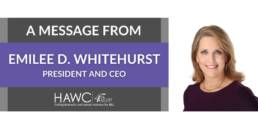The horror of the Uvalde mass shootings that killed nineteen school children and two adults weigh heavily on our collective hearts today. When the awful news broke, we were still processing the racist attack and mass shooting just days earlier in Buffalo, New York.,
These two mass shootings so close together force us to grapple, again, with the gun violence epidemic and that those already vulnerable or marginalized often bear the most harm: children in schools, elderly Black women and men shopping in a grocery a store, Asian members of a church, Hispanic shoppers at a Walmart, Jewish members of a synagogue, customers at a Gay nightclub, and victims of domestic and sexual violence. The fact that the already vulnerable are more likely to be victims of gun violence demands that we ask hard questions about our collective inability or unwillingness to do what it takes to stop the violence in the first place. We do not need to accept mass shootings as inevitable.
You certainly know that HAWC works to end domestic and sexual violence. What you may not know is that HAWC is working on the front lines of the gun violence epidemic. History shows us there is an inextricable link between mass shootings, gun violence, and family violence. Studies find as many as 60% of mass shootings were domestic violence attacks or committed by someone with a history of domestic violence, as is the case in Uvalde. This intersection plays out in the daily lives of women, children, and families.
Where there is a history of domestic or family abuse and there is a gun in the home, a victim of abuse is five times more likely to be murdered. Gun violence accounts for 2/3 of all domestic violence related murders. And that number is escalating right here in Houston as well as nationally.
When victims call our hotline to seek help and advice, one of the most important questions we ask them is whether their abuser has a firearm. When we develop safety plans, we strategize with them to make sure they know where the guns are stored, if they are stored safely, and help them plan for a safe escape for themselves and their children should their abuser go for the gun.
A third of HAWC’s clients are children. Gun violence is now the leading cause of death for children. Did you know more elementary school children are now killed by guns every year than police officers? This is the definition of a public health crisis. As it is predictable, it is preventable.
And so as we grieve, we must also act!
Safer guns and fewer guns, means fewer deaths. That is why we continue to raise our voices and advocate for a public health approach to reducing gun violence. Just as commonsense efforts to prevent and interrupt domestic and sexual abuse are supported and endorsed by both sides of the aisle, one that reduces death rates from guns need not and should not be partisan.
Public health interventions that reduce both gun and domestic violence homicides must include:
- background checks,
- enforced gun removal for abusers with protection orders,
- safe storage,
- investment in technology to prevent stolen guns from being used by unauthorized users, and
- mandatory training requirements that include components on gun safety, child protection, and domestic violence.
As an organization that is in the business of saving lives, we must leverage our attention, acumen, and assets to protect innocent lives and prevent gun violence tragedies. This is our commitment to Uvalde and Buffalo, to our Houston community, and to the survivors we serve.
It’s time. Join us.
Until it stops,

Emilee Dawn Whitehurst
President and CEO
Houston Area Women’s Center

